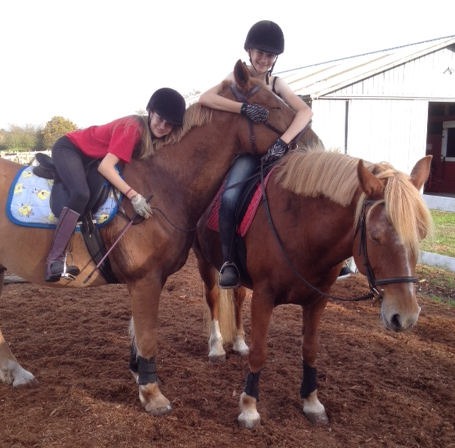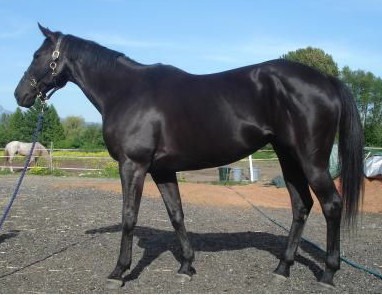Horsemanship Level 3: Maintaining Good Health
This is a continuation of last week's post on
9. Signs of good health, TPR, maintenance of health, signs of colic.
Last week we looked at signs of health, including vital signs (temperature, respiration and pulse). This week's post focusses on keeping your horse healthy, which falls into two categories: prevention of disease, and prevention of injury.
Disease Prevention
Much of disease prevention falls under the umbrella of good stable management, including feeding practices, conditioning, and appropriate stabling and pasture. Other preventative measures you can take include:
- Soak beet pulp and other hard pellets prior to feeding to avoid choke.
- Make sure horses can't get into the feed room accidentally. Gorging on rich feed can cause choke, colic or laminitis, particularly in easy keepers and ponies.

- Limit access to lush new grass, which is high in sugar, and can cause gas colic or laminitis.
- Reduce concentrates if a horse is off work to prevent tying up (azoturia -- a condition of severe and painful muscle cramps).
- Have your farrier visit every 4 to 8 weeks for a trim or re-shoe to prevent lameness and diseases of the foot.
- Make sure tack is clean and fitted correctly to prevent saddle sores, girth galls and rubs.
- Groom your horse regularly to prevent thrush, cracked heels, mud fever, or rain rot.
- Vaccinate for diseases appropriate to your area. All horses should be vaccinated for tetanus, and most should have influenza shots as well. Other diseases, such as rabies and sleeping sickness, are region specific, and other shots are recommended if there is an outbreak (eg. strangles). Consult your veterinarian to see which inoculations are recommended based on your area and your horse's pattern of travel and exposure.
- Have a deworming schedule. Horses pick up parasites from droppings in the pasture. Some horses aren't bothered by them, and some can become sick and fail to thrive according to parasite load and susceptibility. Consult your vet about an appropriate cycle of deworming for your herd.
-

Taz having his teeth floated Give your horse regular dental care. Horses' teeth grow throughout their lives, and uneven wear can create hooks and sharp edges that make eating difficult or wearing the bit uncomfortable. Your veterinarian can 'float' or rasp the teeth to smooth and even them. Young horses should be checked twice a year. Middle aged (8-15 year old) horses usually only need their teeth floated once a year, and older horses may not require it at all. However older horses still should have their teeth checked once a year in case they develop other problems.
Knowing your horse well is an important aspect of recognizing and maintaining health. Abnormal behaviour is often a sign of illness. Listlessness, fever, lack of appetite, sweating, weight loss, runny nose and abnormal breathing are all signs to watch for. Colic, or stomach pain, is one of the more serious equine ailments and signs of this may include kicking or biting at the sides, pacing the stall, frequent lying down and getting up, rolling, sweating, and not eating. Call the vet if you notice these symptoms.
Injury Prevention
Proper and gradual conditioning, working your horse on good footing (not too deep or too hard), correct riding, and avoiding overtaxing your horse will all go a long way to prevent injuries. Other measures are making sure equipment, barns, fences and pasture are free of hazards such as loose wire, holes, broken boards or protruding nails. That said, horses are nothing if not accident prone, and there will be some point in your horse-owning life where you will need to deal with injuries. Next week we will look at when to call the vet, and what to do while you wait for her.
Upcoming Classes
There are only two Cavaliere classes left before we take a break for winter. However, private classes will continue. Private classes are $60, or a flex pack credit. To book a private session contact: jennifer(at)academieduello.com.
Cavaliere Classes
Sundays, 30 November; 14 December, 1:00 – 4:30pm
Cost: $60 or one flex-pack credit per class
Lease Special
 Need more practice time in the saddle? We have a winter special for Academie Duello students only during the months of November, December and January. Lease one of our school horses for one day per week for a cost of only $115 per month (saving $20 per month over regular rates), or $300 for the whole three month period — a savings of $105!
Need more practice time in the saddle? We have a winter special for Academie Duello students only during the months of November, December and January. Lease one of our school horses for one day per week for a cost of only $115 per month (saving $20 per month over regular rates), or $300 for the whole three month period — a savings of $105!
Leases include one free lesson per month, and additional lessons can be booked for $35 each. You must have Riding and Horsemanship level 1 or the equivalent to qualify for a lease. Flex-pack credits may be applied to the lease. Contact Jen at jennifer(at)academieduello.com for more information.
